The Intel Kaby Lake-X i7 7740X and i5 7640X Review: The New Single-Threaded Champion, OC to 5GHz
by Ian Cutress on July 24, 2017 8:30 AM EST- Posted in
- CPUs
- Intel
- Kaby Lake
- X299
- Basin Falls
- Kaby Lake-X
- i7-7740X
- i5-7640X
Benchmarking Performance: CPU Encoding Tests
One of the interesting elements on modern processors is encoding performance. This includes encryption/decryption, as well as video transcoding from one video format to another. In the encrypt/decrypt scenario, this remains pertinent to on-the-fly encryption of sensitive data - a process by which more modern devices are leaning to for software security. Video transcoding as a tool to adjust the quality, file size and resolution of a video file has boomed in recent years, such as providing the optimum video for devices before consumption, or for game streamers who are wanting to upload the output from their video camera in real-time. As we move into live 3D video, this task will only get more strenuous, and it turns out that the performance of certain algorithms is a function of the input/output of the content.
All of our benchmark results can also be found in our benchmark engine, Bench.
7-Zip 9.2: link
One of the freeware compression tools that offers good scaling performance between processors is 7-Zip. It runs under an open-source licence, is fast, and easy to use tool for power users. We run the benchmark mode via the command line for four loops and take the output score.
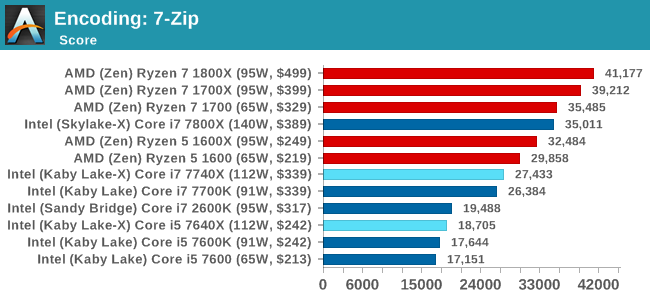
7z loves threads. 7z loves it.
WinRAR 5.40: link
For the 2017 test suite, we move to the latest version of WinRAR in our compression test. WinRAR in some quarters is more user-friendly that 7-Zip, hence its inclusion. Rather than use a benchmark mode as we did with 7-Zip, here we take a set of files representative of a generic stack (33 video files in 1.37 GB, 2834 smaller website files in 370 folders in 150 MB) of compressible and incompressible formats. The results shown are the time taken to encode the file. Due to DRAM caching, we run the test 10 times and take the average of the last five runs when the benchmark is in a steady state.
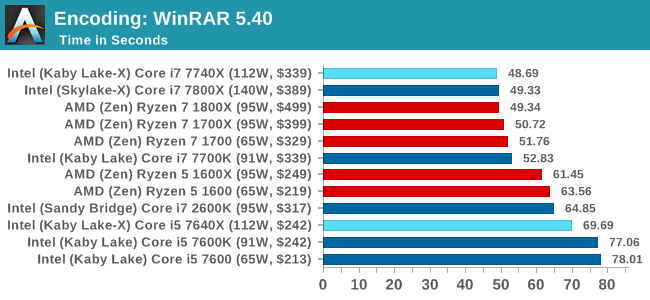
WinRAR is another benchmark like Agisoft, with some parts being serial and others multithreaded. When we compare the Core i7 to the Ryzen 7, the high ST performance helps push the Core i7 to the top despite the 2:1 thread deficit. On the other hand, the Core i5 has a 3:1 thread defecit to the Ryzen 5, and falls beneath it in the results.
AES Encoding
Algorithms using AES coding have spread far and wide as a ubiquitous tool for encryption. Again, this is another CPU limited test, and modern CPUs have special AES pathways to accelerate their performance. We often see scaling in both frequency and cores with this benchmark. We use the latest version of TrueCrypt and run its benchmark mode over 1GB of in-DRAM data. Results shown are the GB/s average of encryption and decryption.
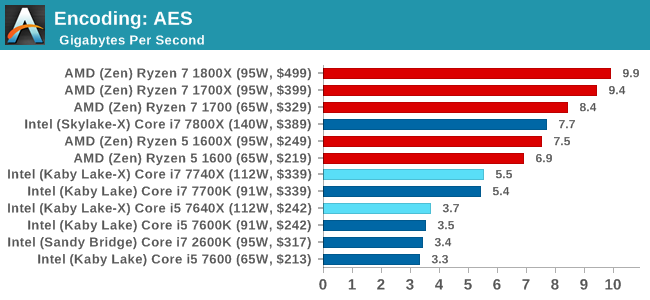
AES is an optimized problem for modern processors, so add frequency and cores to get a proportionally better result. Again, the Core i7-2600K and the Core i5-7640X are almost neck-and-neck.
HandBrake v1.0.2 H264 and HEVC: link
As mentioned above, video transcoding (both encode and decode) is a hot topic in performance metrics as more and more content is being created. First consideration is the standard in which the video is encoded, which can be lossless or lossy, trade performance for file-size, trade quality for file-size, or all of the above can increase encoding rates to help accelerate decoding rates. Alongside Google's favorite codec, VP9, there are two others that are taking hold: H264, the older codec, is practically everywhere and is designed to be optimized for 1080p video, and HEVC (or H265) that is aimed to provide the same quality as H264 but at a lower file-size (or better quality for the same size). HEVC is important as 4K is streamed over the air, meaning less bits need to be transferred for the same quality content.
Handbrake is a favored tool for transcoding, and so our test regime takes care of three areas.
Low Quality/Resolution H264: He we transcode a 640x266 H264 rip of a 2 hour film, and change the encoding from Main profile to High profile, using the very-fast preset.
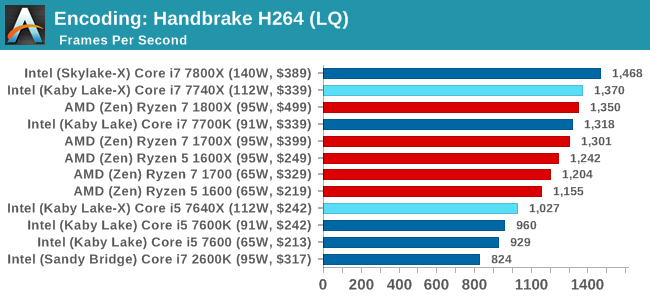
High Quality/Resolution H264: A similar test, but this time we take a ten-minute double 4K (3840x4320) file running at 60 Hz and transcode from Main to High, using the very-fast preset.
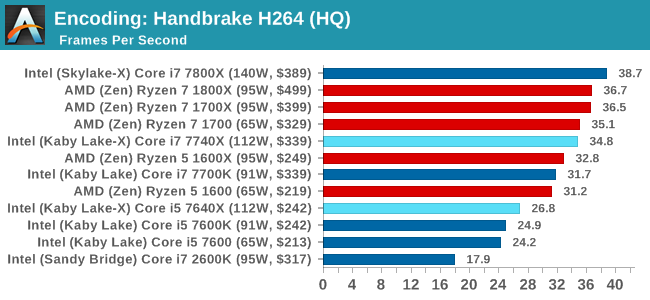
HEVC Test: Using the same video in HQ, we change the resolution and codec of the original video from 4K60 in H264 into 4K60 HEVC.
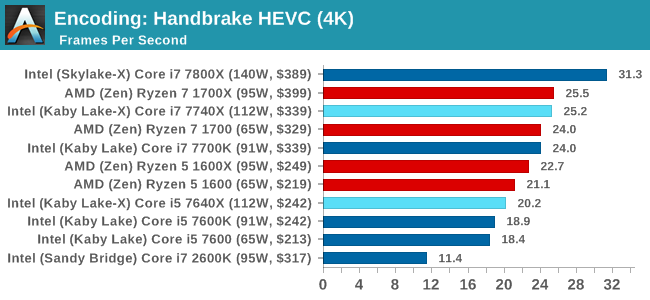










176 Comments
View All Comments
Alistair - Monday, July 24, 2017 - link
I look at it this way: in 2016 I bought a 6600k for $350 CAD. In 2017 I bought a Ryzen 1700 for $350 CAD. Overall speed increase 240%. So AMD delivered 240 percent more performance at the same price in one year. Intel continues to deliver less than 10 percent per dollar. I could care less if the single performance is the same.Call me next time Intel releases a chip a year later that is 240 percent faster for the same price.
Hurr Durr - Monday, July 24, 2017 - link
So you bought yourself inferior IPC and a sad attempt at ameliorating it by piling up cores, and now have to cope with this through wishful thinking of never materializing performance percents. Classic AMD victim behavior.Alistair - Monday, July 24, 2017 - link
First of all, stop using IPC, an expression you don't understand. Use single core performance. In almost every single benchmark I see dramatic speed improvements. I'm comparing the i5 with a Ryzen 1700 as they were the same cost. People harping over the i7-7700k apparantly didn't notice the 1700 selling for as low as $279 USD.Also get higher fps in almost every single game (Mass Effect Andromeda, Civilization and Overwatch in particular).
Alistair - Tuesday, July 25, 2017 - link
I have tremendous respect for Ian, whose knowledge and integrity is of the highest order. I just think some of his words in this review lose the plot. As he said, "it would appear Intel has an uphill struggle to convince users that Kaby Lake-X is worth the investment". He should have emphasized that a little more.In Canada, Ryzen 1700 plus motherboard = $450. i5 (not i7) plus motherboard is $600. Yes, $150 dollars more!
Intel has 20 percent faster single core performance and yet Ryzen is 2.4 times (+140 percent) faster overall... Numbers should speak for themselves if you don't lose the plot. I agree single threaded performance is very important when the divergence is large, such as Apple's A10 vs Snapdragon 835, or the old Bulldozer. But the single threaded gap has mostly closed and a yawning gulf has opened up in total price/performance. Story of the year!
Hurr Durr - Tuesday, July 25, 2017 - link
Extolling price slashing right after launch, boy you`re on a roll today.silverblue - Tuesday, July 25, 2017 - link
I think you should prove why you think Intel is the superior buy, instead of just trolling and not actually providing any rationale behind your "arguments".On Amazon.co.uk right now, there are four Ryzen and one FX CPU in the top 10. Here's the list (some of the recommended retail price values are missing or a bit - in the case of the 8350 - misleading):
1) i7-7700K £308.00; RRP £415.99
2) R5 1600 £189.19; RRP £219.95
3) R7 1700 £272.89; RRP £315.95
4) i5-7600K £219.99; RRP £?
5) i5-7500 £173.00; RRP £?
6) FX-8350 £105.50; RRP £128.09
7) i5-6500 £175.09; RRP £?
8) R5 1500X £165.99; RRP £189.98
9) Pentium G4400 £48.90; RRP £?
10) R5 1600X £215.79; RRP £249.99
There must be a ton of stupid people buying CPUs now then, or perhaps they just prefer solder as their thermal interface material of choice.
Advantages for Intel right now: clock speed; overclocking headroom past 4 GHz; iGPU (not -X CPUs)
Disadvantages for Intel right now: price; limited availability of G4560; feature segmentation (well, that's always been a factor); overall platform cost
An AMD CPU would probably consume similar amounts of power if they could be pushed past 4.1GHz so I won't list that as a disadvantage for Intel, nor will I list Intel's generally inferior box coolers as not every AMD part comes with one to begin with.
The performance gap in single threaded workloads at the same clock speed has shrunk from 60%+ to about 10%, power consumption has tumbled, and it also looks like AMD scales better as more cores are added. Unless you're just playing old or unoptimised games, or work in a corporate environment where money is no object, I don't see how AMD wouldn't be a viable alternative. That's just me, though - I'm really looking forward to your reasons.
Gothmoth - Tuesday, July 25, 2017 - link
no first of = stop arguing with stupid trolls...prisonerX - Monday, July 24, 2017 - link
I can double my IPC by having another core. Are you really that dumb?Hurr Durr - Tuesday, July 25, 2017 - link
AMD victim calling anyone dumb is peak ironing. You guys are out in force today, does it really hurt so bad?wira123 - Tuesday, July 25, 2017 - link
yeah intel victim is in full force as well today, which is indeed ironic